40 Health Symptoms That Can Be More Serious Than You Think

How many times have you noticed something wrong with your health and thought, Oh, I'll wait it out. It'll pass. It's probably no big deal. Lurking in the back of your head is the terror that maybe it is a big deal. That maybe you should call a doctor. That maybe this is The One. It's scary, this thing called staying alive. But you're not alone. Your body is there, communicating with you every day.
While occasional aches and pains are nothing to stress about, specific symptoms are your body's way of telling you there's something else going on. If you listen up and seek treatment quickly, you can prevent an emergency or an irreversible diagnosis. Read on to discover 40 health symptoms that may be signs that something serious is going on.
You keep forgetting people's names

Did you completely space on a co-worker's name or call your neighbor Jim instead of Sanjeev? An occasional slip-up on someone's name is normal, especially if you're low on sleep or high on stress. If you're noticing that you're frequently forgetting people's names or common words seem to disappear when you need them, you may have hypothyroidism.
With this disorder, your thyroid doesn't produce the proper combination of hormones, which can cause fogginess, grogginess, and a low energy level. According to the American Association of Clinical Endocrinologists, about 30 million Americans who have hypothyroidism go undiagnosed because they aren't aware of the warning signs.
Body Network Rx: If you're suffering from these symptoms, it's time to get some blood work done. Your doctor can check your thyroid hormone levels and prescribe medication to balance your levels back out and keep you healthy.
You're excessively sweating

You might sweat in a stressful office meeting, during a tough workout, or if your broadcast news segment's a flop. In these situations, some perspiration is totally normal. However, if you find yourself dripping in situations that don't warrant a sweat sesh—or your sweat is brought on suddenly and intensely—it may be a sign that something else is going on.
You may have primary focal hyperhidrosis, which is a genetic disorder that causes excessive sweating on your feet, hands, face, and underarms. That can be treated with medication or specialized antiperspirant, and you've probably had it since birth.
On the other hand, it could be secondary hyperhidrosis, which is associated with other underlying medical conditions. According to the Mayo Clinic, this symptom can be giving you a warning sign that you're dealing with heat exhaustion, menopause, Non-Hodgkin's lymphoma, or other serious conditions that may need treatment right away.
Body Network Rx: Excessive sweating is uncomfortable and could be a sign of another underlying condition. Go see a doctor if you get wet.
You see little red or white dots under your fingernails
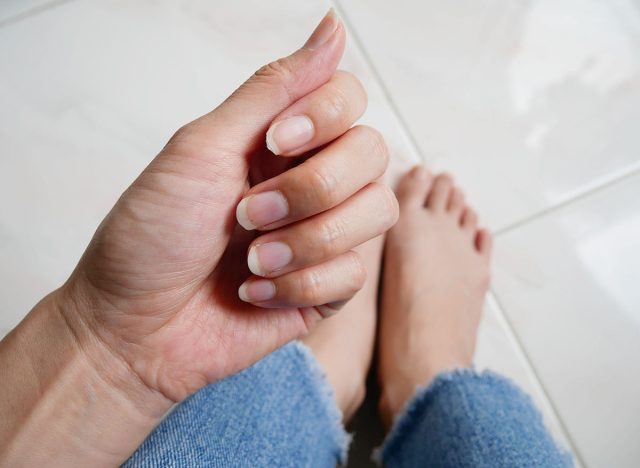
These small red streaks or dots under your fingernails are referred to as "splinter hemorrhages." These hemorrhages are usually the result of a nail trauma. So, you might see a red or white streak or dot under your nail if you accidentally dropped something heavy on your hand or closed your fingers in a doorway. However, if you feel like these little streaks have shown up for no reason, they might be a sign of an underlying medical condition.
You may have systemic lupus erythematosus (SLE), which is an autoimmune disease that causes blood clotting, joint pain, and erratic circulation to the fingers. It's also possible that you're suffering from nail psoriasis, which is a disorder that causes excess skin cells to build up on the nails. Another cause of this hemorrhaging could be antiphospholipid syndrome, which can occur if you have another medical condition, such as lupus. It can cause blood clots in the arteries or veins.
Body Network Rx: If you get splinter hemorrhages that are painful or accompanied by a fever, you need to get them checked out. You should also go see your doctor if they're accompanied by additional red dots on your skin or joint pain.
Your skin looks pale
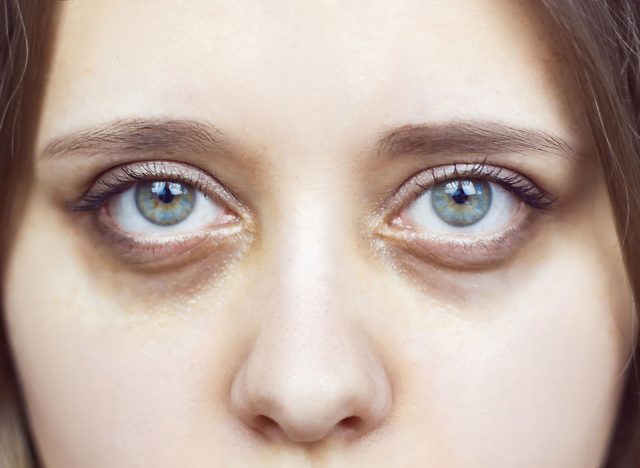
In the dead of winter, you're bound to lose your summer glow and look like a White Walker. But if your skin suddenly looks paler than usual, it could be a sign of reduced blood flow throughout your body. A lighter skin tone may also mean that your body's red blood cell production has reduced dramatically. If this lighter skin pigment is accompanied by unexplained weakness or fatigue, you may have anemia, which means your blood is having trouble carrying enough oxygen to your body.
According to the National Heart, Lung, and Blood Institute, anemia is the most common blood disorder and it affects 3,000,000 Americans. In most cases, the cause of this disorder is iron deficiency, so you may need to take iron supplements or include more iron-fortified foods in your diet, like red meat, dried fruit, or dark leafy greens.
Body Network Rx: You'll need to get some blood work done to check your iron levels. If it's anemia, your doctor can suggest dietary changes and supplements to manage your condition.
Your handwriting style changes

If you're jotting down your grocery list and notice that your words look more crowded together, or much smaller than when you usually write them, it might be an early warning sign of Parkinson's disease.
Dr. Michael S. Okun, MD, national medical director for the Parkinson's Foundation, tasks his patients with repeatedly writing a sentence when he's attempting to diagnose the disease. He can identify the disease because, "As they write, each sentence gets smaller and smaller, and the words become more crowded together." You may also notice you've lost your sense of smell and you have vivid dreams that cause you to kick and thrash in your sleep.
Body Network Rx: If these symptoms persist over a few weeks, make an appointment with a neurologist to get it checked out. The sooner you have a diagnosis, the sooner you can begin receiving treatment to manage these symptoms.
You've started snoring

About 90 million American adults experience occasional snoring, according to the National Sleep Foundation. These periodic bouts of sawing logs can happen after you've consumed alcohol, when you're suffering from allergies, or while you're getting over a cold. If your snoring becomes consistent every night, you may have a deviated septum or enlarged tonsils.
If your nighttime snoring routine is accompanied by additional symptoms, such as high blood pressure, chest pain at night, the inability to concentrate, or you find yourself gasping for air when you wake up, you may be suffering from sleep apnea. With this disorder, your sleep is being constantly disrupted throughout the night because muscles in the back of your throat can't keep your airway open. This annoying and exhausting condition can increase your risk for cardiovascular disease.
Body Network Rx: You'll need to consult your doctor to see if surgery can help to correct the problem. Keep track of your snoring and sleeping patterns so you can relay this information to your doctor. He or she can get you a clear diagnosis and treatment plan so you can get some restful sleep.
You're peeing a lot more

Most people urinate six to seven times in 24 hours. However, everyone is different so don't panic if you urinate more or less than this. If you find your pee schedule has increased but you're also drinking a lot more water or other fluids, it's perfectly normal. But if you feel you're urinating much more frequently for no reason, it may be a sign of bladder or kidney problems.
An increase in your trips to the restroom can also be attributed to a urinary tract infection, a mass in your pelvic region, or a sexually transmitted disease, such as chlamydia.
Body Network Rx: If you feel like you're always on a potty break and can't figure out why, it's best to get yourself checked out by a doctor.
You get frequent heartburn

Heartburn is an uncomfortable burning sensation in the throat or chest from stomach acid. It can be caused by eating decadent or spicy foods or consuming alcohol. Obsese or sedentary people are more inclined to suffer from heartburn frequently, as well as smokers.
If you find yourself popping heartburn pills more than a few times a week, you're on track for some nasty side effects. Remedying your own frequent heartburn or just living with the condition can eventually cause inflammation in the esophagus, which can lead to ulcers and serious bleeding. You may also be putting yourself at a greater risk for esophageal cancer if you ignore your frequent heartburn.
Body Network Rx: Your doctor may be able to isolate what's causing this heartburn and help you to alleviate it so you can avoid more serious conditions later on. Make an appointment right away!
Your cheeks broke out in a rash

Your cheeks may flush or get red if you have a fever or your body temperature rises during a workout or in a hot climate. However, if you notice a red butterfly-shaped rash on your cheeks and can't figure out why, it could be a sign of something more serious.
While this rash is usually painless and not itchy, it's a symptom of lupus erythematosus, a complex autoimmune disease. According to the Lupus Foundation of America, this disease is more likely to affect women between the ages of the ages of 15 and 44 years.
Body Network Rx: While your cheek rash may not be related to lupus, it's best to get it checked out so you can rule out this disease. The sooner your doctor gets you on a treatment plan, the more likely it is that you can avoid other symptoms of this disease.
You feel a numbing sensation

Numbness may just be a sign that you sat on your foot for too long. But if you're getting a pins and needles sensation on only one side of your body or in your face, arms, or legs, it may be an indication that you're having a stroke and you need to seek medical treatment right away. According to Dr. Edward C. Jauch, M.D., from the Medical University of South Carolina, if you think you might be having a stroke, "Wait-and-see should not be a part of the decision process."
In addition to this numbness, you may also feel sudden confusion, experience blurred vision, or have difficulty speaking if a stroke is the culprit. If you don't suspect it's a stroke, your numbness may be due to another condition, such as Grave's disease, a herniated disc, or complications from diabetes.
Body Network Rx: If you think you're having a stroke, call 911 right away. But if this numbness is attributed to something else, make an appointment with your doctor to get a firm diagnosis.
You're losing weight without even trying

If you've made changes to your diet, or have increased your exercise regimen, it makes sense that you'd lose weight. But if those factors haven't changed, and the weight is still falling off, there may be a more serious issue. According to Dr. Richard Wender, MD, from the American Cancer Society, if you lose more than 10 pounds unexpectedly with no changes to your diet or exercise routine, it's time to get it checked out.
Unexplained weight loss can potentially be attributed to cancer, but it can also mean that you're suffering from another serious condition, such as:
- Rheumatoid arthritis.
- Overactive thyroid.
- Chronic obstructive pulmonary disease (COPD).
- Tuberculosis.
- HIV.
- Congestive heart failure.
- Inflammatory bowel disease.
Body Network Rx: The sooner you get a diagnosis, the faster your doctor can get you treated to prevent other serious issues. See your practitioner if you suddenly lose weight.
You notice that a skin mole looks different
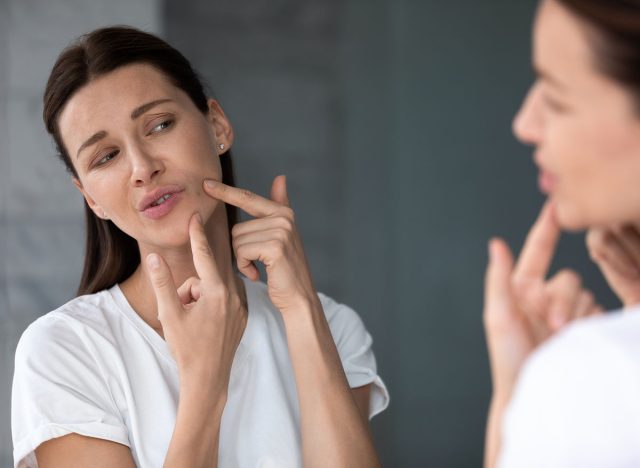
If a mole is symmetrical and doesn't change shape or color, it's generally nothing to worry about. However, if you notice a mole that's oddly shaped or if you think one of the moles you've had for a while just changed shape or color, you should see a dermatologist. Moles that change in appearance can indicate that you may have skin cancer, such as melanoma or basal cell carcinoma.
Body Network Rx: The American Academy of Dermatology recommends every adult get a skin evaluation annually from a dermatologist. However, you should visit one immediately if you notice any of your moles have recently changed. If they're caught in time, these types of skin cancers can usually be treated and removed so they cause no further damage.
You feel really thirsty all the time

Thirst is the first sign of dehydration, which can lead to headaches, dizziness, and other unpleasant symptoms. According to the National Academies of Sciences, Engineering, and Medicine, men should drink about 15.5 cups of water each day and women should consume about 11.5 cups. If you've noticed that you're thirsty a lot more often than you used to be, it could be associated with changes in your diet or workout routine. An increase in exercise, change in weather, or eating more salty foods than normal can make you more thirsty.
If your thirst increase isn't associated with any of these lifestyle changes, keep a close watch because it could be tied to diabetes. Excessive thirst can also be a side effect of some types of medication and can also happen when you're pregnant.
Body Network Rx: If you're not sure why you're always thirsty, it wouldn't hurt to make an appointment with your doctor to get some bloodwork done so you can rule out something more serious.
The skin on your palms is thick and textured

Your hands do almost everything for you so it'd be pretty hard to ignore if the skin on your palms suddenly felt thick and velvety. This condition is often referred to as "tripe palms" because it makes your skin look similar to tripe, the stomach lining of a sheep or cow. In most cases, tripe palms are an indicator that a malignant tumor is growing inside the body.
A study published in the Journal of Clinical Oncology analyzed 77 patients suffering from tripe palms. It was found that 94% of these patients had malignant tumors and only five weren't diagnosed with some type of cancer. Pulmonary tumors were the most common diagnosis among these study participants.
Body Network Rx: If you notice these skin changes on your palms, it's important to see your doctor. In most cases, it's a sign that a malignant tumor has just started growing, allowing you to seek treatment while it's still in the early stages.
You're really tired all the time

If you got a full eight hours last night but feel like you could sleep for eight more, you may need to make some positive changes to your lifestyle, such as eating healthier foods or exercising. If you feel like you're genuinely healthy, your sleepiness could be telling you that there's something more serious going on with your body. Extreme fatigue and a low energy level could be signs pointing to any number of conditions, including:
- Hypothyroidism. According to Dr. Theodore Friedman, MD, Ph.D., people with an underactive thyroid will feel tired because "their cells aren't working well, they're sluggish, and their reflexes are slow."
- Heart disease. If your heart doesn't pump as well as it should, you could be on the road to congestive heart failure. Excessive tiredness can be an early warning sign that your heart is having trouble functioning.
- Depression. If you're depressed, your body's serotonin levels are low. This chemical is used to regulate your sleep schedule. A messed up sleep schedule can easily lead to chronic tiredness and the desire to sleep a lot.
- Menopause. Night sweats and hot flashes can make it hard to sleep when you're going through menopause. Interrupted sleep can make you extremely tired throughout the day, so this might be the culprit for struggling to keep your eyes open.
Body Network Rx: Don't continue to suffer through these groggy days. Go see your doctor so you can rule out a serious condition and get some advice on how to increase your energy level.
Your skin is breaking out
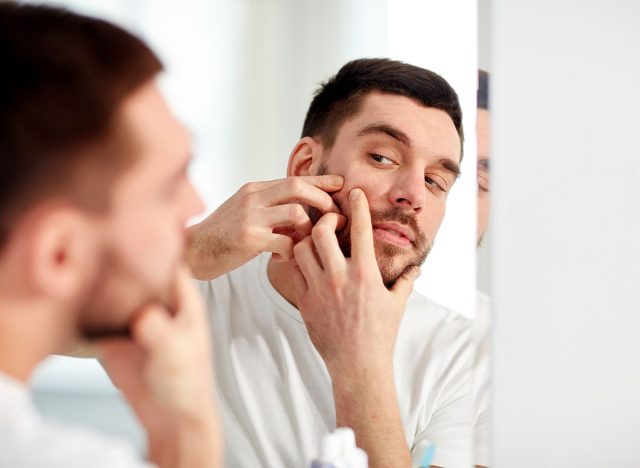
Acne breakouts aren't just annoying, they can also be a symptom of other imbalances in your body. If you recently changed facial cleansing products or it's your time of the month, a few zits can be easily explained. However, if you've never really had pimples before and you're dealing with some harsh breakouts, you should take it seriously.
Acne is a sign that your body is producing too much oil or that it's come in contact with bacteria. Consistent acne that's unresponsive to treatments can occur if your body is dealing with hormonal imbalances. It can also occur when you begin to go through menopause.
Body Network Rx: A trip to the doctor can help you to better understand the root cause of your breakouts so you can get your body back in harmony. Your doctor may also refer you to a dermatologist to help get your skin clear again.
You have a cough that won't quit

A nagging cough can linger from a past cold or flu for a good few days and that's normal. However, if you have a persistent cough that didn't come from a prior illness and that's been sticking around for weeks, it's cause for concern. If you're a smoker, you may have a smoker's cough that could be cured by quitting this unhealthy habit. If not, your cough could be a symptom of something serious, like lung cancer, a lung infection, or pertussis, also known as whooping cough.
Body Network Rx: If your cough is accompanied by a fever, it could be a lung infection that needs antibiotics. Whooping cough and lung cancer also need to be treated immediately, so visit a doctor if your cough just won't quit.
Your skin feels dry and cracked
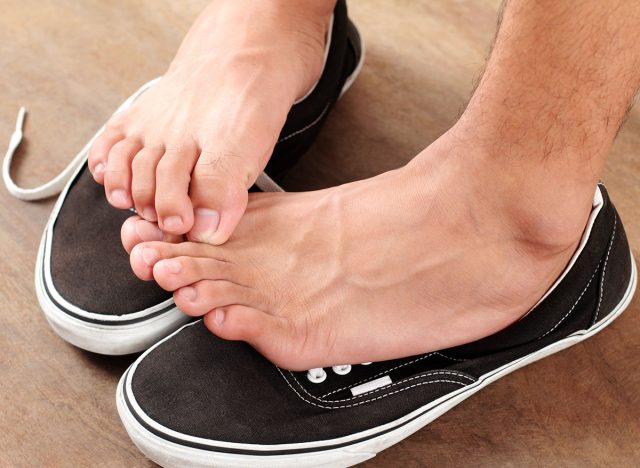
It's common to experience dry skin in the wintertime when the air is dry. But this dry and cracked skin can also be a sign of a fungal infection, such as athlete's foot. Feet are the most vulnerable because they don't have oil producing glands that hydrate and combat the growth of fungal bacteria.
You might also have eczema or other forms of dermatitis. According to the Mayo Clinic, you can easily identify eczema because it makes your skin red and itchy in addition to dryness. Eczema looks more like a rash than a simple cracking of the skin due to dehydration.
Body Network Rx: If you suspect you have eczema, make an appointment with your dermatologist. After a firm diagnosis, he or she can provide you with topical creams or medications to help alleviate the discomfort associated with these breakouts.
You suddenly have trouble doing basic math

If you've always been good with numbers but you've been noticing how difficult it's been lately to add up home project measurements or calculate a server's tip, take this symptom seriously. A sudden inability to calculate simple math equations may mean you're in the early stages of Alzheimer's disease.
When this disease begins to develop, the brain's cortex is affected, which is responsible for managing finances and solving math equations. But Dr. Daniel Marson, PhD, from the Alzheimer's Disease Center at the University of Alabama in Birmingham, states, "it's a red flag if these issues persist on a regular basis." So, if you blanked on a calculation once or twice, don't fret. However, make a doctor's appointment right away if you're increasingly finding it harder to come up with the answers to basic calculations.
Body Network Rx: Your doctor can put you through a series of tests to confirm or rule out Alzheimer's. If you are diagnosed, medications and treatment can help slow the progression of the disease.
You feel dizzy a lot

Dizziness can be defined as a spinning sensation, near-fainting experience, or a simple feeling of imbalance, according to the American Osteopathic Association. If you experience dizziness every once in a while when you stand up suddenly, chances are you have low blood pressure or low blood sugar levels, which is something you should keep an eye on.
However, if you suffer from chronic dizziness, the underlying cause may be something you need to get checked out immediately. If you frequently experience dizziness along with vertigo, you may have benign positional vertigo (BPV), which is a disturbance in your inner ear. These symptoms may also be caused by Meniere's disease, which occurs when the fluids in your ears build up. You may also have a noncancerous tumor called an acoustic neuroma on the nerve that connects your inner ear to your brain. See your doctor and explain the type of dizziness you feel and when you're feeling it so you can get a solid diagnosis.
Body Network Rx: Take notes on when your dizziness occurs, what it feels like, and if you experience other symptoms along with it. Go see your doctor or an Ear, Nose, and Throat (ENT) specialist to find out what's causing it and how to make it stop.
You've been randomly throwing temper tantrums

Random bursts of anger can sometimes be warranted if your football team loses, your significant other pushes your buttons, or you get passed up for a well-deserved promotion. You can also experience intense mood swings if your blood sugar level has gotten too low at some point during the day or you haven't had adequate sleep.
But if you find yourself uncontrollably throwing temper tantrums frequently, you could have clinical depression. Most people think of depression as a disorder that makes you want to listlessly hide under the covers for days. Some people who suffer from depression, however, experience these bursts of intense anger instead.
According to a study published in JAMA Psychiatry, it's more common for women to be diagnosed with depression but it's more common for men to experience this condition through anger and irritability.
Body Network Rx: If you simply can't control these mood swings and random bouts of anger and you think depression is to blame, a doctor can prescribe you medication and provide you with other resources to get you back on track.
There are white rings around your corneas

White or off-white rings around the cornea is a condition called arus senillis. It's not unusual to see this condition if you're over 30 years of age. However, if you're younger than 30 years of age and notice this whitening, it's cause for concern. In younger people, arus senillis is a potential sign of high cholesterol, which can be caused by genetics or poor diet. According to the American Heart Association, bad cholesterol is a fatty, waxy substance that can build up in the artery walls. This increases your risk for a stroke, heart attack, and peripheral artery disease (PAD).
Body Network Rx: If you notice these white rings around your cornea and you're under 30, make an appointment with your doctor so you can check your cholesterol levels and investigate other potential underlying issues.
You're losing or growing too much body hair

It's normal to begin growing body hair at puberty and then for this hair growth to slow during middle age and beyond. Our body experiences these changes in hair growth because our hormone levels change at these periods in our lives.
While these subtle hormone changes are normal, extreme changes in body hair growth or loss patterns should be closely observed. These dramatic changes could signal unhealthy fluctuations in hormone levels. In most cases, women with unbalanced hormone levels will see too much hair growth while men will see a loss in body hair.
Body Network Rx: If you've noticed dramatic hair loss or growth, head to your doctor's office so you can make sure your hormones are balanced.
You've gained a ton of weight, but only around your waist

The extra weight around your belly can be caused by a number of things, such as poor diet, lack of exercise, alcohol consumption, menopause, stress, or genetics. It's often referred to as visceral fat—the most dangerous kind of fat—since it surrounds vital organs, like your liver and lungs. Even if you don't have extra weight anywhere else, your spare tire can be extremely unhealthy. Excess belly fat can make you more susceptible to diabetes and heart disease, including heart rhythm problems, blood vessel diseases, coronary artery disease, and other heart conditions.
A study published in the Journal of the American Heart Association took body measurements of 500,000 participants, aged 40 to 69, then observed them for the next seven years. The study concluded that women who carry more weight around the middle have a 10% to 20% higher risk for a heart attack than women whose bodies were more proportional.
Body Network Rx: If you're having trouble losing your gut, go see a doctor for help so you can lower your risk for these serious conditions.
You feel swollen
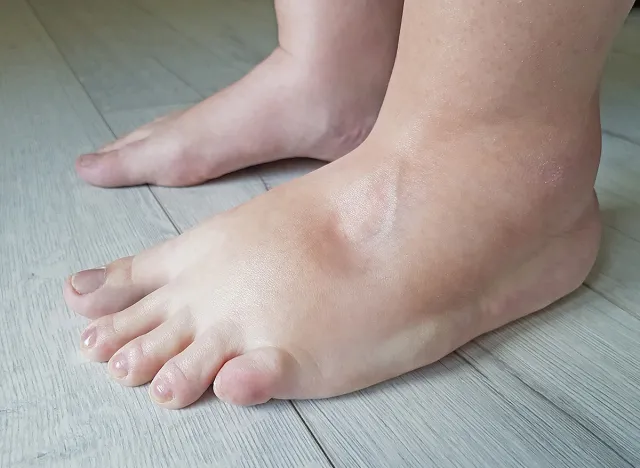
Swelling is a common sign that something is wrong. Your body uses swelling and inflammation to combat infection and to heal and repair tissue that's damaged. If your feet or ankles are swollen, it's more than likely linked to poor circulation. This could mean your blood vessels are weakening or there's a blood clot in your veins. If left untreated, blood clots are dangerous and can cause a stroke or other heart-related traumas, so you should seek medical treatment immediately.
If you have generalized swelling or inflammation, it may be a sign of edema. According to the Cleveland Clinic, edema can be the result of an allergic reaction or something more serious, such as heart failure or liver disease. Living with edema without treatment can be tough on your body. The extra fluid puts pressure on your organs and can lead to other conditions, such as weakening of the heart.
Body Network Rx: If you feel swollen and it's not just because you ate too much salt, make an appointment with your doctor so you can get on a treatment plan.
Your chest hurts

According to the Centers for Disease Control and Prevention, abdominal and chest pain are the most common reasons for emergency room visits for patients over 15 years of age. Chest pain is the most well-known sign of a heart attack or other heart trauma, so it's no wonder more people visit the emergency room for this symptom than any other.
Your chest may hurt for a number of reasons, including a pulled muscle or severe heartburn. But you should definitely be concerned by your crushing chest pain if it was brought on suddenly and accompanied by:
- A tightness in the chest.
- Heavy pressure.
- A squeezing sensation.
- Pain in the shoulder, jaw, back, or arm.
If you also feel nauseous or sweaty, it's another good indication that you're experiencing a heart attack or another type of heart-related trauma.
Body Network Rx: Call 911 immediately and don't ignore this pain.
Your teeth feel really sensitive
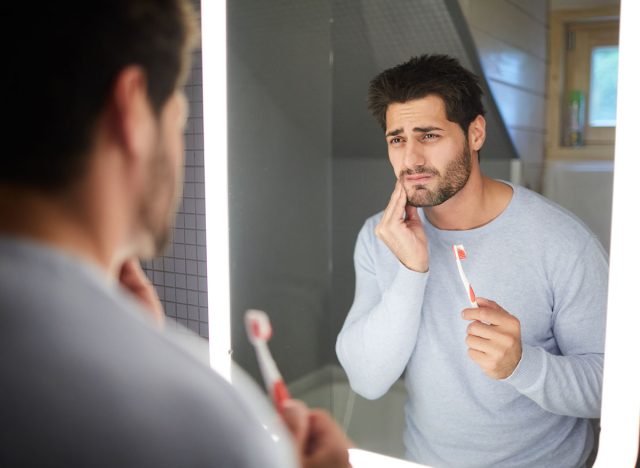
As we age, our tooth enamel begins to wear away, making us more sensitive to cold or hot foods. However, if you notice that the enamel in the back of your teeth is wearing down rapidly, it could be a sign that you have acid reflux. While sugary drinks and snacks will wear down the enamel on the front of your teeth, stomach acids are the culprits for the disappearance of enamel in the back of the teeth. A study by the University of Alabama found that 40% of gastroesophageal reflux disease (GERD) patients had significant tooth decay and only 10% of them weren't diagnosed with acid reflux.
Body Network Rx: It's important to seek treatment from a gastrointestinal (GI) specialist if you or your dentist notice this pattern in your enamel loss. If your acid reflux goes untreated, it can cause tooth decay or loss and can also increase your risk for esophageal cancer.
You feel symptoms after exertion

"Symptoms of exhaustion, or post-exertional malaise as it's called, are a hallmark of long COVID and similar complex illnesses like chronic fatigue syndrome or ME/CFS," says NPR. "The idea that exercise can help patients has proven difficult to shake — despite evidence suggesting this isn't merely a case of deconditioning that patients can overcome by pushing through the pain." It goes on: "By taking biopsies from long COVID patients before and after exercising, scientists in the Netherlands constructed a startling picture of widespread abnormalities in muscle tissue that may explain this severe reaction to physical activity. Among the most striking findings were clear signs that the cellular power plants, the mitochondria, are compromised and the tissue starved for energy."
Body Network Rx: If you've have COVID and have felt post-exertional malaise, talk to a doctor about alleviating the issue and pacing.
Your gums look inflamed

Dental health is more important than you think. There's a link between the bacteria that causes gum disease and the bacteria that causes heart disease. Therefore, poor oral health can lead to more serious medical conditions, including heart disease.
According to Dr. Thomas Boyden, MD, from Spectrum Health Medical Group Cardiovascular Services, "If you disrupt the gum layer even a little bit, you're going to get bacteria in your bloodstream, which can go anywhere and trigger inflammation throughout the body." And inflammation is what causes damage to the blood vessels, including the ones that go to your heart.
Body Network Rx: Inflamed gums are a sign of gum disease, which is caused by a bacteria buildup and can be prevented by regular flossing, brushing, and trips to the dentist every six months. If your gums are inflamed, it's also important to keep tabs on your heart health, so visit your doctor regularly.
There's blood in your urine

Blood in your urine is shocking and can be a sign that you have one of several different medical conditions. If you notice blood in your urine, you may have a bladder infection, kidney stones, or kidney disease. It may also mean that you have bladder cancer or a benign tumor in your bladder or kidneys.
According to the American Cancer Society, if you have bladder cancer, the blood in your urine may not even be accompanied with pain or discomfort. It also may appear once, then disappear for several weeks before reappearing again.
Body Network Rx: At the first sign of blood in your urine, go see a doctor and get it checked out. If you do have bladder cancer, you'll have a better prognosis if you catch it early and begin treatment right away.
RELATED: 6 Full-Body Workouts to Activate Every Muscle Group
You have a rash on your skin

An itchy, blistery skin rash may seem like a simple allergic reaction or an eczema breakout. But, in some cases, this rash may be telling you that you have celiac disease. This autoimmune disease is popularly known as a digestive reaction to gluten, but some sufferers don't experience any digestive symptoms at all. Skin reactions may be the only clue that you need to cut out gluten from your diet. According to the Celiac Disease Foundation, only 1 in 100 people are affected by this disease worldwide.
Body Network Rx: Before you throw out your loaf of bread and swear off Coors for life, get with your doctor. He or she can perform a gluten sensitivity test to see if celiac disease is the culprit for your skin rash or if an environmental factor is to blame.
You feel a stabbing pain in your back

You might feel a sudden twinge of back pain if you pull a muscle while lifting a piece of heavy furniture or trying to Dab. But if you feel a random intense tearing sensation in your back and it's unrelated to a muscle injury, it could be a sign of a ruptured aorta. This occurs when an aneurysm grows in your aorta and one or more layers of the artery wall splits.
You may not even feel this aneurysm growing since there are generally no symptoms of this condition. According to the Mayo Clinic, when an aorta ruptures, this intense stabbing back pain may also be accompanied by labored breathing, a loss of consciousness, nausea, trouble swallowing, or signs of a stroke, such as body numbness.
Body Network Rx: If you feel this twinge of back pain for more than 20 minutes and it's accompanied by any of these other symptoms, seek emergency treatment right away.
You notice blood in your stool

When you find blood anywhere it's not supposed to be, especially in your stool, it can be concerning. Before you panic, consider your recent diet. If you ate beets, drank red juices, or consumed red gelatin in the past few days, your stool may be bright red but it's not blood.
If you're sure it's blood you're seeing in the toilet bowl, take it seriously. If the blood is coming from the outside of your body, you may have an anal fissure or hemorrhoid, which can cause this bleeding and will be accompanied by pain. These conditions should go away on their own, but if you continue to experience discomfort, you should see a physician for treatment.
In other cases, you may be suffering from an inflammatory bowel disease (IBD), such as Crohn's disease or ulcerative colitis. Steroids and immune-modifying agents can help you to manage any of these diseases. Blood in your stool can also be an indication of colorectal cancer. According to the American Cancer Society, 145,600 people will be diagnosed with this type of cancer in 2019 and 51,020 people will die of the disease. However, the number of deaths from colorectal cancer decreased by 25 percent in recent years due to early detection and fast treatment.
Body Network Rx: Make an appointment with your doctor for a cancer screening right away so this disease can be caught and treated early or ruled out altogether.
RELATED: 8 Best 5-Minute Frozen Meals for Weight Loss, According to Nutritionist
Your joints feel swollen and stiff

Joint stiffness can occur as you age or after a tough workout. Generally, joint stiffness is more prevalent in the morning or after a long stretch of non-movement. However, if your joint stiffness is coupled with some mobility issues or swelling, it may be a symptom of a deeper issue.
If you have consistent joint pain, you may be suffering from rheumatoid arthritis (RA). According to the Arthritis Foundation, RA affects over 1.5 million Americans, making it the most common form of arthritis. Sufferers are born with this disease, but the symptoms commonly appear in those who are 30 to 60 years of age. It's an auto-immune disease that causes an inflammation in the joints, which can be painful and limit mobility.
Body Network Rx: RA has no cause and unfortunately, no cure. However, the sooner you visit your doctor and get diagnosed, the sooner you can get on a treatment plan that makes it easier for you to continue enjoying life.
You keep getting nosebleeds

Dryness, allergies, or irritation can cause a nosebleed, so don't panic if you see a drip of blood every once in awhile. Blood thinning medications can also make you more prone to experiencing nosebleeds when other potential factors are triggered. Your nose has several sensitive blood vessels close to the surface, which causes bleeding to occur easily when disrupted.
However, chronic nosebleeds are something you should watch out for because they could be a sign of a nasal tumor or leukemia. If you experienced a nose injury and your nose simply won't stop bleeding, it's also cause for concern and you may need medical attention.
Body Network Rx: If you're getting nosebleeds every week or your nosebleeds last more than 20 minutes, make a doctor's appointment. Your doctor will take precautionary steps to ensure you don't have a serious condition. If that's ruled out, he or she can give you suggestions on how to stop the bleeding, such as using a humidifier or switching your allergy medications.
Your muscles feel weak or stiff

Muscle weakness can be attributed to a number of causes. Maybe you pushed it hard in your workout yesterday or you're coming down with a cold. If this is the case, your muscle weakness or stiffness should go away in a few days. If the symptom persists, you may be suffering from Chronic Fatigue Syndrome (CFS), muscular dystrophy, low blood sodium, or another serious condition.
CFS causes extreme and unexplained fatigue and specific causes of the disease have yet to be identified. According to the Office on Women's Health, CFS is most common in women aged 40 to 50 and there aren't any tests to diagnose the disease. Your doctor will simply need to rule out all other conditions related to your muscle weakness and fatigue.
Muscular dystrophy can occur at any age, but most likely, it will rear its ugly head in your younger years. It's more common in boys than in girls and shows itself in the form of poor posture, bone thinning, trouble walking, and loss of reflexes, among other symptoms. Surgery or medication may be prescribed to help sufferers deal with this condition.
If you have insufficient sodium in your blood, it can also lead to muscle weakness, stiffening, and cramps. You can also experience confusion, irritability, and nausea. This condition can occur when you're dehydrated, which can be caused by certain medications or other conditions. Your doctor can help you feel better with an intravenous (IV) sodium solution and can help you figure out why this happened and how to prevent it in the future.
Body Network Rx: If your muscle weakness and stiffness just won't go away, see your doctor so you can figure out what's going on and how to fix it.
You're seeing spots

Eye floaters can look like black or gray specks in your vision that move around as you try to look at them. These floaters become more common when you get older because your vitreous, a jelly-like substance in your eyes, becomes more fluid-like. Small fibers clasp together in this liquidy substance and they cast shadows in your retina, which look like these little floating specks.
According to the Mayo Clinic, it's common to see an increase in eye floaters if you are:
- Over 50 years of age.
- The victim of an eye trauma.
- Experiencing complications from recent cataract surgery.
- Suffering from eye inflammation.
- Nearsighted.
- Living with diabetic retinopathy.
However, if you see a sudden and intense increase in the number of eye floaters you see, it could be a sign that you have a retinal tear, which can lead to a retinal detachment and eventual blindness if left unrepaired. (This happened recently to Slashfimcast podcaster Jeff Cannata, who tearfully recounted his diagnosis on air.)
Body Network Rx: If your floaters are getting more intense, get it checked out with your eye doctor. You may need surgery to correct the problem and ensure it's not something more serious.
You get lightheaded when you stand up

Ever get a little woozy when you stand up after lying or sitting down for awhile? It's a form of low blood pressure called orthostatic hypotension or postural hypotension. While it has a scary name, this condition actually pretty common and nothing to worry about if it happens from time to time.
However, if you experience this lightheadedness upon standing frequently or it's accompanied by fainting or blurred vision, you may have a more serious problem. It can be a sign that you have:
- Heart problems. A low heart rate or heart valve issues can lead to orthostatic hypotension since your body may not be able to distribute your blood fast enough when you stand.
- Endocrine conditions. Thyroid problems, diabetes, or other issues with your endocrine can also cause this symptom since it can damage the nerves that help regulate blood pressure.
- Nervous system disorders. If your nervous system is compromised by a disorder like Parkinson's disease, orthostatic hypotension is also common since your nerves can't regulate blood flow.
Body Network Rx: Take notes on when you feel lightheaded and how many times it happens in a day. Then, visit your doctor so you can discuss the probable causes and figure out the underlying issue.
RELATED: 5 Strength-Training Exercises for Sculpting a Triathlete's Physique
You have trouble swallowing

If you notice a feeling of fullness in your throat that makes it tough to swallow, an enlarged thyroid may be to blame. Your doctor can order an x-ray to see if this is the case. If so, you may have a thyroid imbalance and your doctor may prescribe medication to balance out your hormone levels.
However, if it feels like your esophagus just isn't functioning properly and you have difficulty swallowing (also known as dysphagia), you may have a medical condition. According to the University of Michigan Medical Department, this symptom can happen to anyone but it's most common for older adults, babies, and people who have brain or nervous system problems.
You could have scleroderma, a condition that causes the esophageal walls to harden and become narrow. This condition also makes your lower esophageal muscles weak, which can be the reason you feel you can't swallow properly.
Body Network Rx: If this swallowing difficulty doesn't go away, make an appointment to see your doctor. He or she will analyze your diet, health history, and other important factors to figure out what's going on.
You always have a sore throat

A sore throat can be caused by an airborne irritant, such as paint fumes, or may be an indicator that you're suffering from allergies or a cold. Smoking or snoring can also be the culprits for a lingering sore throat. But if your sore throat is with you night and day, it could be a sign of something worse.
According to the American Academy of Otolaryngology Head and Neck Surgery, if your sore throat persists for five to six days straight, it could mean you have a bacterial infection, such as tonsillitis, or a virus, such as mono. In extreme circumstances, you may be diagnosed with epiglottitis, a throat infection that causes restriction in the airways and trouble breathing, which warrants an immediate ER trip. However, in most cases, you may simply need an antibiotic to kill the infection.
Body Network Rx: Visit your doctor to see if an infection is to blame. If not, he or she can begin to isolate the problem and figure out a treatment plan. And if you enjoyed this article, don't miss 15 Quick Ways to Lose Body Fat Percentage in a Week.




